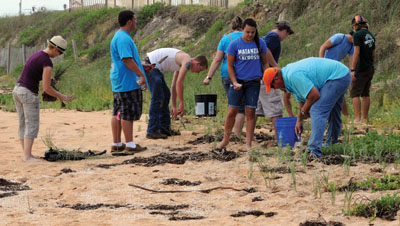Deep-freezing sea oats seeds and sheets may create business opportunities for commercial growers when dunes need restoring

Florida Sea Grant researcher Mike Kane.
Sea oats are much more than decorative beach foliage. The wispy grass creates a natural barrier between land and water by trapping wind-blown sand, providing stability in beach dunes. A Florida Sea Grant researcher is developing novel techniques to keep this natural barrier in place for years to come.
“The 2004 hurricane season showed us exactly how important it is to have effective ways of rebuilding our coastal dunes,” said Mike Kane, the University of Florida environmental horticulture professor leading the study. “Plants are an essential part of that rebuilding.”
Unfortunately, many of the natural sea oats populations that serve as seed sources for the plants used to rebuild dunes were damaged or destroyed during the 2004-2005 hurricane seasons, leaving researchers looking for ways to produce sea oats other than by seed.
Using a process known as micropropagation, Kane grows small samples in the form of shoot buds in nutrient-rich gels that contain plant-derived chemicals to spur rapid development. The shoots are then moved to a greenhouse, where they continue to grow in preparation for their final move to the beach.
“Sea oats are extraordinarily genetically diverse,” Kane said. “Beaches can have very different conditions, and it’s important to try to plant the kinds of sea oats best adapted to local conditions.”
With funds from Sea Grant, Kane is now developing a method to cryogenically freeze thousands of sea oats samples from all major populations along Florida’s coasts. The collection of frozen specimens will be used to give native plant growers the types of sea oats native to specific areas.

Kane’s research includes an education and outreach component. Students at Matanzas High School in Palm Coast grew sea oats in a greenhouse and later planted them in dunes. “There’s no doubt this experience gave them a greater appreciation of the importance of maintaining Florida’s coastal resources,” said Maia McGuire, Florida Sea Grant extension agent for Flagler and St. Johns counties.
“There is a need for millions of these plants, and this is the sort of work that is going to allow us to fill that need,” said Gary Hennen, president of Oglesby Plants International, a Florida-based business that uses micropropagation to commercially produce plants. The company hopes to be one of many that put Kane’s research to good use. “That’s not only going to be good for our beaches, but it’s potentially a major boon for a lot of businesses, as well.”



